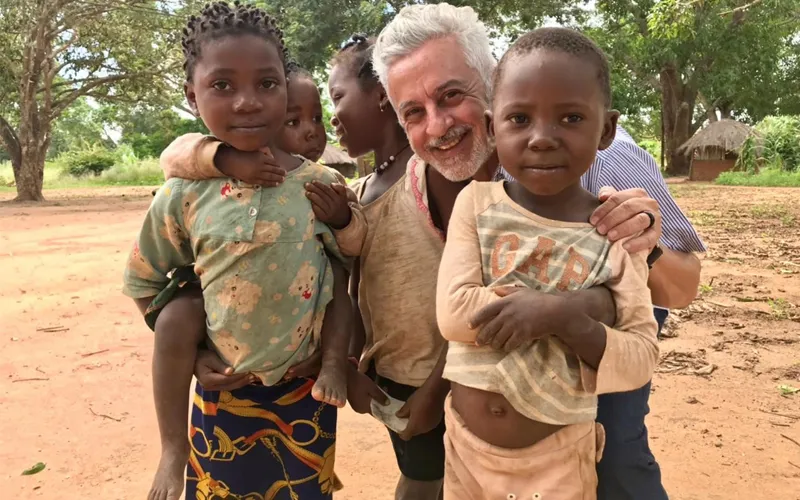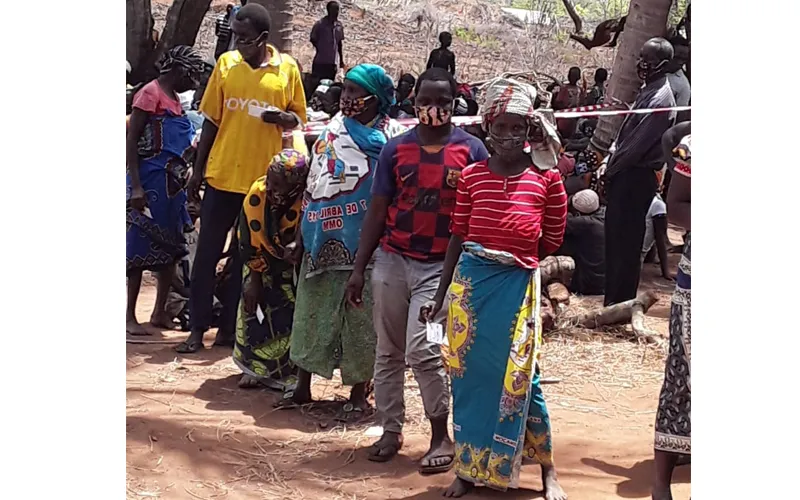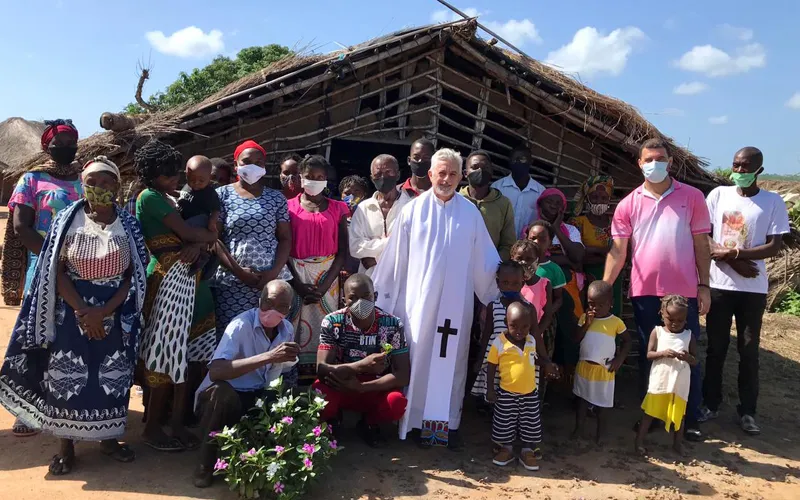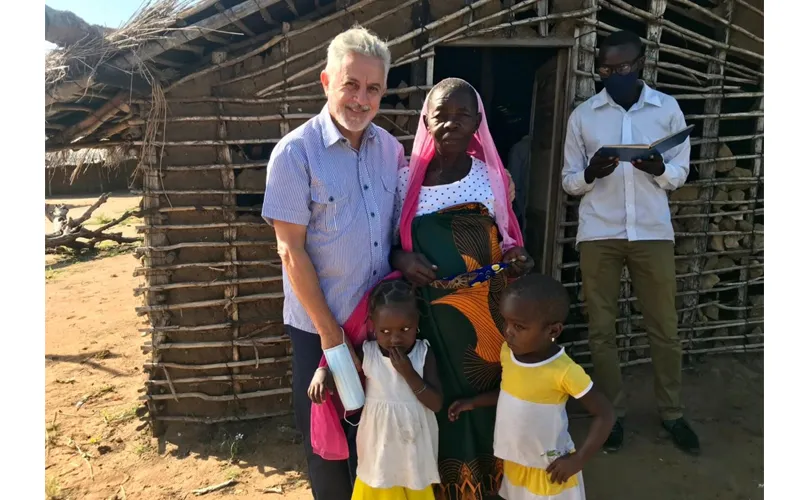
The Missionary further recalls that the Mission had the community radio São Francisco de Assis, a dental clinic, a house of the Priests, a house of the Sisters, a well, catechesis rooms, bedrooms, kitchen, dining room, among other facilities.
All these, he shares, were destroyed with the attacks that took place between 31 October and 19 November 2020, when the terrorists invaded and took over the village.
He recalls that in Muidumbe’s first attack in April last year, the terrorists destroyed the only hospital in the district, the small bank branch, the gas station and the administration buildings.
This was the time that the Missionary Priest fled to Pemba in the company of other people who survived the attack.
(Story continues below)
He shares the experience of witnessing the killings and destruction, saying, “It hurts our hearts when we see that everything has turned to ashes and debris. We hope to return one day, but we know that it will take a long time to rebuild what was burned and destroyed.”

“We know that concrete structures including the radio station, the temple and others can be rebuilt. But we will never have back the many lives that were violently taken away; decapitated bodies, kidnapped youth, missing children,” the Priest says, and adds, “These are heard reports that cut our hearts.”
He says that at the moment, the concern is not to reconstruct the buildings in Muidumbe but rebuild the lives of survivors of the violence who he says have been deeply scarred. Many of these people, the Cleric shares, are saddened by the murder and abduction of their family members.
“Sadness is stamped on the face of each displaced person,” Fr. Silva says, and adds, “We are experiencing a deep mourning that affects all expressions of community life including the language spoken among them, the customs, the songs and dances, the festivals of the people. The song of joy gave way to tears.”
“The strong sound of Mapiko's dance gave way to silence. It resembles the pain of exile, of the forced diaspora, as the people of God lived in the Old Testament,” the Brazilian Priest shares in his moving reflection.

In his message to the remnants of the troubled Cabo Delgado region, the MS Priest says, “We missionaries miss you too. We would love to be present in the community, carrying out the mission entrusted to us: taking care of schools, health ministry, community radio, days full of meetings.”
He further says, “We waited for the night to rest and, the next day, to restart activities. We wrote a letter to express our desire to be with the people. As missionaries, we are also displaced.”
He expresses sadness that unlike missionaries who have the support of their institutions, poor locals living as refugees are helpless.
He divulges that the displaced locals are living in precarious conditions, whether in the camps or in the backyards of the houses where they are taken in.

In many attacks, civilians are taken by surprise and flee carrying nothing to help them on the way. Many of these, Fr. Silva shares, end up in bushes where they live in hiding and face the danger of starvation and diseases.
“People stay in the bush in precarious conditions, go hungry and thirsty until they find ways to reach a city outside the war area,” he says, adding that in some cases, those seeking refuge are turned away in what is referred to as “unwanted crossing.”
Last month, DHPI reported that residents who fled last month’s militant attack in Palma, a town in Northern Mozambique, were turned back when they tried to enter neighboring Tanzania.
Many provinces in Mozambique that are relatively safe especially in the Southern parts of the country are, however, more welcoming to the people fleeing war zones in Cabo Delgado. Fr. Silva is working with charity organizations in Pemba to help resettle these victims of insurgency.

“We help many families to escape from the forest to the city by paying for transportation. At that time, we thank the gesture of solidarity of many people. When they leave the forest, they go to different cities, not only Pemba, but also the neighboring provinces have received many displaced people,” he says.
Those fleeing arrive in the city in Pemba and go to the homes of family members or acquaintances. Fr. Silva says that many of these houses can receive up to 30 people, while others go to settlements created by the Mozambican government, also marked by extremely precarious conditions.
“After so many days in the bush, undergoing all kinds of deprivation, they arrive with a disfigured, sad and worried face,” the Missionary Cleric says of the situation of refugees in Pemba.

“They (refugees) suffer from many diseases including diarrhea, anemia, malaria, with a higher prevalence in women and children,” he says.
Those who arrive are usually weighed down by traumatic experiences of having witnessed the barbaric killings of their loved ones. Many are disjointed families missing fathers, mothers and children. They are therefore usually welcomed by people from humanitarian organizations including the Diocese of Pemba through Caritas and Parishes.
The Priest shares about the deteriorating humanitarian situation in Pemba, saying, “There was a moment when everything seemed quiet, and suddenly, behold, in small boats, thousands of people arrived on the beach in the neighborhood of Paquite. On that day, we directed all our forces towards that reality.”
Fr. Silva says that as much as humanitarian organizations strive, the number of people who need this support has grown disproportionately.
Calling on the people of God in the Southern African country to denounce violence, Fr. Silva says, “If the voice of the prophets is silent, the stones will cry!”
“The Diocese of Pemba has long denounced this wave of violence. When we were in the Northern region, in Muidumbe, we talked about war and security at every meeting with the people,” he says.
The Brazilian-born Priest calls for prayers and humanitarian assistance from the rest of the world for Northern Mozambique, saying that the people in the region need to be supported.
“Cabo Delgado wants peace! In your prayer and that of the community in which you participate, place the intention for peace in Mozambique,” the Cleric further says, and adds, “This war needs to be denounced. We need your support to continue humanitarian action.”
Agnes Aineah is a Kenyan journalist with a background in digital and newspaper reporting. She holds a Master of Arts in Digital Journalism from the Aga Khan University, Graduate School of Media and Communications and a Bachelor's Degree in Linguistics, Media and Communications from Kenya's Moi University. Agnes currently serves as a journalist for ACI Africa.
















